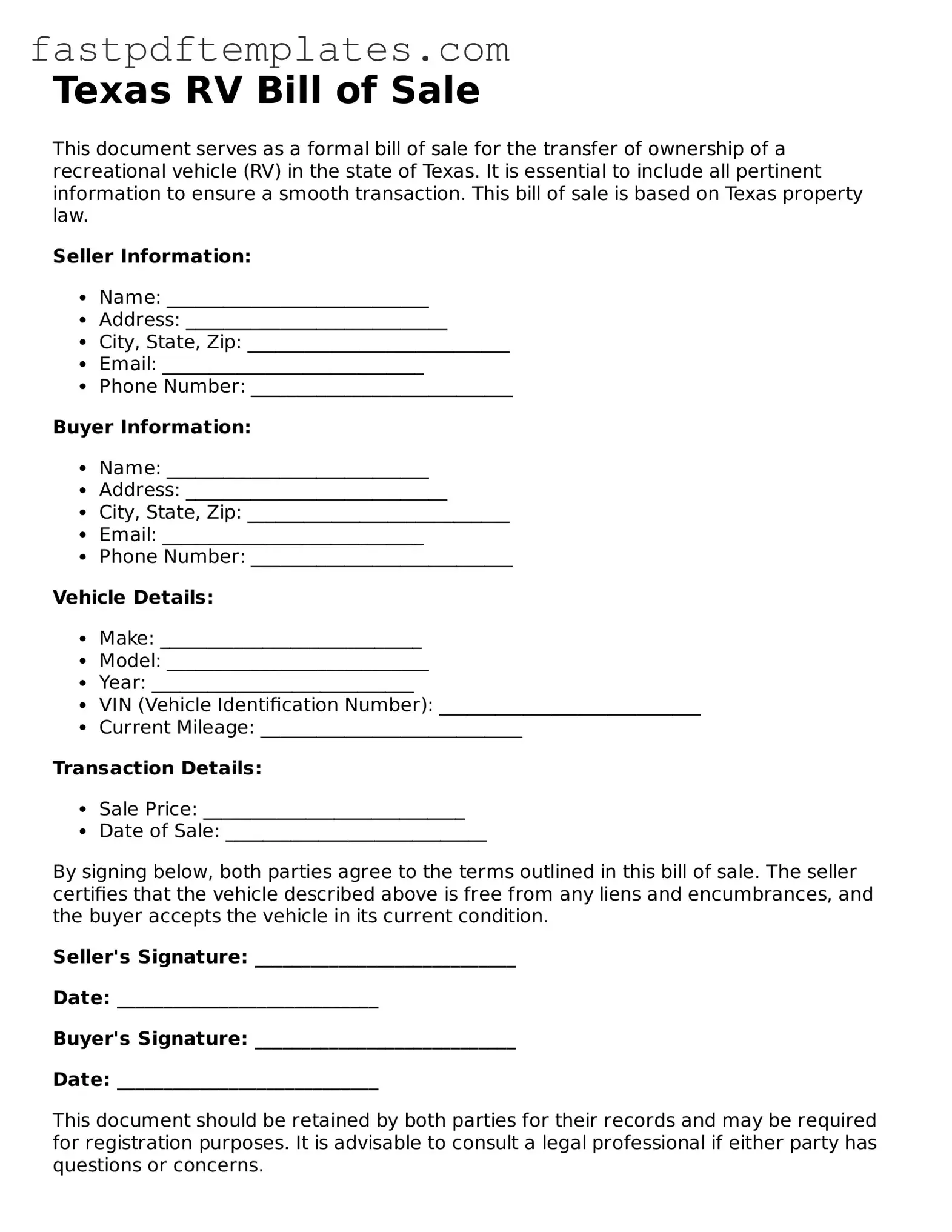The Texas RV Bill of Sale form shares similarities with the standard Vehicle Bill of Sale. Both documents serve as proof of the transfer of ownership from one party to another. They typically include details such as the buyer's and seller's names, addresses, and signatures, along with a description of the vehicle, including its make, model, year, and Vehicle Identification Number (VIN). This document is essential for registering the vehicle in the new owner's name and can be crucial in resolving any disputes regarding ownership in the future.
Another document that resembles the Texas RV Bill of Sale is the Boat Bill of Sale. Like the RV Bill of Sale, this form is used to document the sale of a watercraft. It includes similar information, such as the buyer and seller's contact details, a description of the boat, and the sale price. Both documents help protect the interests of both parties by providing a clear record of the transaction, which can be useful for registration and titling purposes.
The Motorcycle Bill of Sale also shares key characteristics with the Texas RV Bill of Sale. This document is specifically tailored for the sale of motorcycles, but it follows the same format and includes similar information. Both forms require identification details of the buyer and seller, as well as specifics about the motorcycle, such as the VIN and any unique features. This ensures that both parties have a written record of the transaction, which is important for ownership verification and future resale.
In addition, the Trailer Bill of Sale is comparable to the Texas RV Bill of Sale. This form is used when a trailer is sold, and it serves the same purpose of documenting the transfer of ownership. Like the RV Bill of Sale, it includes the names and addresses of the buyer and seller, a detailed description of the trailer, and the sale price. This document helps facilitate the registration process and provides proof of ownership, which is essential for both parties involved.
The Personal Property Bill of Sale is another document that resembles the Texas RV Bill of Sale. While it can be used for various types of personal property, it often contains similar elements. This form includes the names and addresses of the parties, a description of the property being sold, and the agreed-upon sale price. Both documents serve to protect the interests of both parties by providing a written record of the transaction, which can be important in case of any disputes.
The Lease Agreement can also be compared to the Texas RV Bill of Sale, albeit in a different context. While the RV Bill of Sale documents a sale, a Lease Agreement outlines the terms under which one party rents property from another. Both documents require clear identification of the parties involved and detailed descriptions of the property. They serve to establish legal rights and responsibilities, ensuring that both parties understand their obligations during the transaction.
The Warranty Deed is another document that, while primarily used for real estate transactions, shares some similarities with the Texas RV Bill of Sale. Both documents are used to transfer ownership and require detailed descriptions of the property involved. A Warranty Deed provides a guarantee that the seller has clear title to the property, while the RV Bill of Sale serves as proof of ownership transfer for recreational vehicles. Both documents aim to protect the interests of the parties involved in the transaction.
Lastly, the Affidavit of Ownership is a document that can be likened to the Texas RV Bill of Sale. This affidavit is often used when a person needs to declare ownership of a vehicle, especially when there is no formal bill of sale available. Like the RV Bill of Sale, it includes identifying information about the vehicle and the owner. Both documents serve to establish proof of ownership, which can be crucial for registration and legal purposes.

